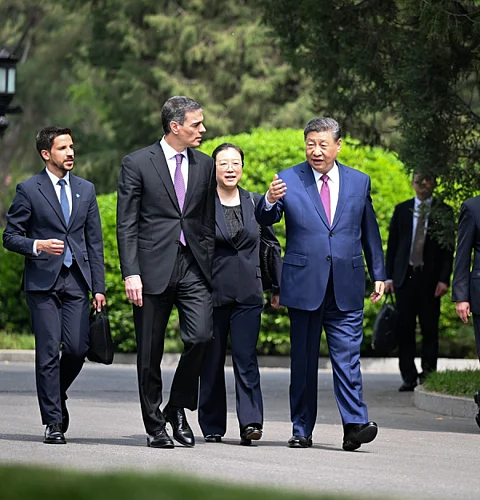

Chinese President Xi Jinping has urged Western nations to uphold multilateralism and open cooperation during a meeting with Spanish Prime Minister Pedro Sánchez in Beijing, as China seeks allies in its escalating trade dispute with the United States.
“The two sides should promote the building of a fair and reasonable global governance system, maintain world peace and security, and promote common development and prosperity,” Xi told Sánchez, who is visiting China as part of a two-nation Asian tour.
Though Xi did not directly mention U.S. President Donald Trump or Washington's rising tariffs on Chinese goods—now reaching as high as 145%—he warned of "multiple risks and challenges" that require "unity and cooperation" to overcome.
The visit comes at a critical time in global trade dynamics. Trump’s recent announcement of additional tariffs, later temporarily paused for some partners including the European Union, has stirred debate across Europe. Some leaders are pushing for closer ties with Beijing, while others remain cautious of drifting too far from Washington.
Spain Walks a Diplomatic Tightrope
Prime Minister Sánchez, on his third trip to China in two years, reaffirmed Spain’s intention to deepen cooperation with China without alienating Western allies.
“Trade wars are not good. Nobody wins,” Sánchez said after his meeting with Xi. “The world needs both China and the United States to talk.”
While in Beijing, Sánchez is also expected to meet with executives from major Chinese companies, particularly those in renewable energy and electric battery sectors. China has become increasingly important for Spain’s green transition; the country now generates 56% of its electricity from renewable sources and relies on Chinese materials and technology.
China’s growing investment in Spain includes a €4.1 billion joint venture between battery manufacturer CATL and automaker Stellantis, as well as recent agreements on green hydrogen infrastructure.
Still, not all reactions to Spain’s engagement with China have been positive. U.S. Treasury Secretary Scott Bessent criticized the visit, warning that “any country that attempts to cosy up to Beijing would be cutting their own throat,” citing fears that Chinese goods blocked from the U.S. could flood European markets.
Spain’s Agriculture Minister Luis Planas defended the government’s approach. “Expanding trade relations with a partner as important as China does not go against anyone,” he said during a visit to Vietnam, the other leg of Sánchez’s Asian tour.
Spain has historically adopted a less confrontational stance toward China compared to some EU counterparts. Though it initially backed EU tariffs on Chinese electric vehicles last year, Madrid abstained from a later vote on the measure. Planas described Spain’s position as one that "contributes to the collective EU effort to navigate this complex situation."
EU-China Ties in Focus
Sánchez’s visit has reignited debate within the EU over its future relationship with China. Some leaders favor closer economic alignment with Beijing, while others stress maintaining transatlantic unity.
Ahead of his visit, Sánchez consulted with European Commission President Ursula von der Leyen and EU Trade Commissioner Maroš Šefčovič. Reports from the South China Morning Post indicate that EU leaders are planning a July summit in China to mark the 50th anniversary of diplomatic relations between the two sides.
President Xi emphasized the importance of EU-China cooperation in a time of global uncertainty and reiterated China’s desire for deeper ties with Spain. “The more turbulent and volatile the international situation becomes, the more valuable our relationship grows,” he said.
Sánchez echoed those sentiments, stressing the need for multilateral cooperation on global challenges such as climate change, inequality, and international development. He added that Spain is committed to pursuing a “balanced” and “active” foreign policy that benefits from partnerships across global power centers.
The visit to Beijing concludes Sánchez’s tour, which also included trade talks in Vietnam aimed at boosting exports of Spanish pork and cherries. Spain currently supplies around 20% of China’s pork imports, according to industry group Interporc.
With EU-China ties under increasing scrutiny, Sánchez’s trip may offer a glimpse into the bloc’s evolving strategy—one that seeks to balance relations with both Washington and Beijing in an era of geopolitical and economic uncertainty.